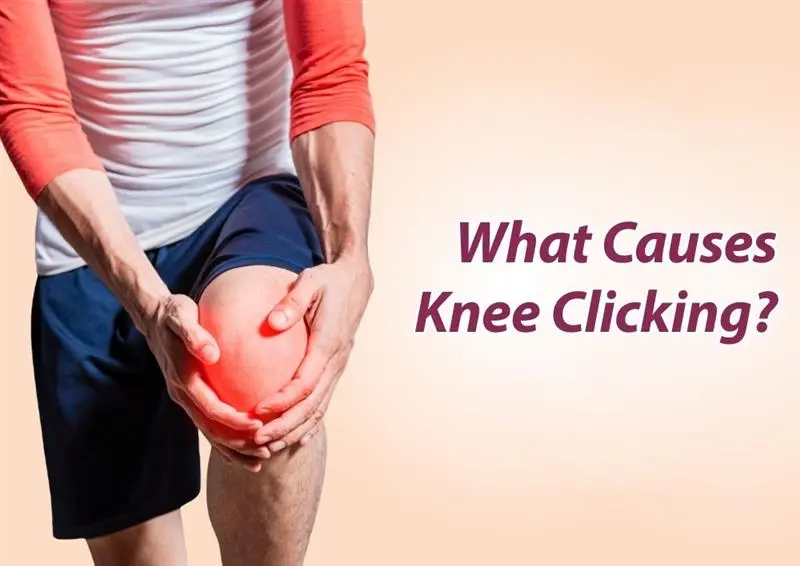What Causes Knee Clicking? Understanding the Reasons
Summary
Have you ever heard a small click from your knee while taking steps? Or maybe your knee makes a popping sound when you bend, stretch, or climb stairs? These little noises can feel strange and sometimes even worrying. While many people experience knee clicking without any serious problem, certain types of sounds can be a sign that something inside the knee joint needs attention.
Knee clicking is extremely common across all age groups. In many cases, it is completely harmless and a natural part of the joint movements. However, when the clicking sound in the knee is frequent or accompanied by pain, stiffness, or swelling, it may indicate an underlying knee condition that requires proper evaluation.
In this blog, we will explore the causes of knee clicking and effective ways to manage and prevent knee discomfort.
1. Gas Bubbles in the Joint
Your knee joint contains a lubricating fluid called synovial fluid. Sometimes, tiny gas bubbles form in this fluid and burst when the joint moves. This produces a fast, harmless clicking noise.
Dr. Sumit Anand, senior orthopedist, Miracles Apollo Cradle/Spectra, explains, “In many patients, clicking caused by gas bubbles is completely normal. It is just the joint fluid adjusting to movement. If there is no pain or swelling, there is absolutely nothing to worry about.”
Signs:
-
No pain
-
No swelling
-
Occasional clicking only
This does not require treatment.
2. Ligament or Tendon Movement
The knee has strong ligaments and tendons that help stabilize the joint. During movement, these structures may stretch and snap back into place, creating a clicking sound.
This is common when:
-
Turning suddenly
-
Getting up quickly
-
Exercising without a warm-up
This type of clicking is usually normal unless it comes with instability.
3. Weak or Tight Muscles Around the Knee
Muscle imbalance is one of the most common reasons for repeated knee clicking. When the quadriceps, hamstrings, glutes, or IT band are tight or weak, they can pull the knee out of its ideal alignment.
This causes the joint to make repetitive clicking sounds during movement.
You may experience:
-
Clicking while climbing stairs
-
Knee stiffness after inactivity
-
Mild discomfort
Proper stretching and strengthening exercises help fix this.
3. Meniscus Tear
The meniscus tear is a C-shaped cartilage in the knee that absorbs shock.
A tear can cause:
-
Clicking
-
Locking
-
Swelling
-
Pain while twisting the knee
Meniscus injuries are common in sports, sudden twisting movements, or due to age-related wear.
If clicking is sharp or painful, a doctor should evaluate it.
4. Kneecap Misalignment
When the kneecap doesn’t move smoothly over the thigh bone, it creates:
-
Clicking or grinding
-
Pain while squatting
-
Pain after long sitting
-
Discomfort climbing stairs
This condition is often seen in runners or people with weak thigh muscles.
5. Osteoarthritis
As we age, the cartilage inside the knee can wear down.
This reduces cushioning and leads to:
-
Clicking or cracking
-
Pain after activity
-
Morning stiffness
-
Swelling
Osteoarthritis is one of the leading causes of chronic knee pain in older adults.
6. Previous Knee Injury
If you have had a ligament tear, fracture, or knee surgery before, some clicking may continue due to structural changes in the joint.
This is normal unless there is new pain or instability.
7. Tendinitis
Inflamed tendons rub against bones and soft tissues, causing snapping or clicking sensations.
This often worsens with repetitive movement or high-intensity workouts.
8. Overuse Injuries
Activities that put repeated strain on the knee, like running, jumping, or cycling, can lead to:
-
Clicking
-
Swelling
-
Weakness
This is commonly referred to as runner’s knee.
How Do Doctors Diagnose Knee Clicking?
To understand the underlying cause, a doctor may suggest:
-
Physical examination
-
Gait analysis to study walking patterns
-
X-ray to check bones and alignment
-
MRI scan to examine cartilage and ligaments
-
Ultrasound to assess soft tissue movement
Accurate diagnosis ensures proper treatment and prevents worsening of knee problems.
Home Remedies to Reduce Knee Clicking
1. Strengthening Exercises
Focus on strengthening:
-
Quadriceps
-
Hamstrings
-
Glutes
-
Calf muscles
Strong muscles keep the knee stable and reduce clicking.
2. Regular Stretching
Stretching releases tension in tight muscles like:
-
Hamstrings
-
Quads
-
IT band
-
Calf muscles
This helps improve alignment.
3. Ice and Heat Therapy
-
Apply ice for swelling or sharp pain
-
Use heat for stiffness and muscle tightness
4. Maintain a Healthy Weight: Extra body weight increases pressure on the knees, worsening pain and clicking.
5. Wear Supportive Footwear: Shoes with proper arch support help keep the knee aligned.
6. Avoid Prolonged Sitting: Take movement breaks every 30–40 minutes.
Knee Clicking Medical Treatment Options
If home remedies don’t help, doctors may recommend:
-
Physiotherapy to correct muscle imbalance
-
Anti-inflammatory medication
-
Corticosteroid injections to reduce inflammation
-
Hyaluronic acid injections for joint lubrication
-
Arthroscopic surgery for severe cartilage or meniscus injuries
-
Customized braces for better knee support
When to Consult a Doctor?
Knee clicking becomes a concern when it is paired with:
-
Severe or constant pain
-
Swelling or stiffness
-
Knee locking or catching
-
Difficulty bending or straightening the knee
-
Instability or giving way
-
Redness or warmth around the joint
These symptoms can indicate conditions like:
-
Meniscus tear
-
Ligament injury
-
Osteoarthritis
-
Patellofemoral pain syndrome
-
Bursitis
-
Tendinitis
Consult an orthopedist near you if any of these symptoms are present.
Conclusion:
Knee clicking is a common experience and is often harmless. However, if the clicking is frequent, painful, or linked with swelling or stiffness, it is important to get a proper medical evaluation. Early care can prevent long-term joint problems and help you stay active without discomfort.
Frequently Asked Questions
You can fix a clicking knee by strengthening the surrounding muscles, stretching regularly, and avoiding overuse; if pain continues, consult an orthopedic specialist for evaluation.
Most knee clicking is harmless, but regular clicking with pain or swelling may indicate joint misalignment, inflammation, or cartilage issues.
Not always, meniscus tears can cause clicking, but painless clicking is usually because of harmless causes like gas bubbles or tendon movement.
Occasional cracking is normal; worry only if it comes with pain, swelling, locking, or difficulty moving the knee.
Try muscle strengthening, stretching, icing, and correcting posture; constant pain needs medical evaluation to determine the cause.
Painful clicking usually suggests an issue like a meniscus tear, ligament strain, arthritis, or inflammation, and should be checked by a doctor.
Miracles Apollo Cradle/Spectra is one of the best hospitals for knee clicking and knee pain treatment in Gurgaon, offering expert orthopedic care and advanced diagnostic facilities.









.webp)





Was the information useful?
4 0